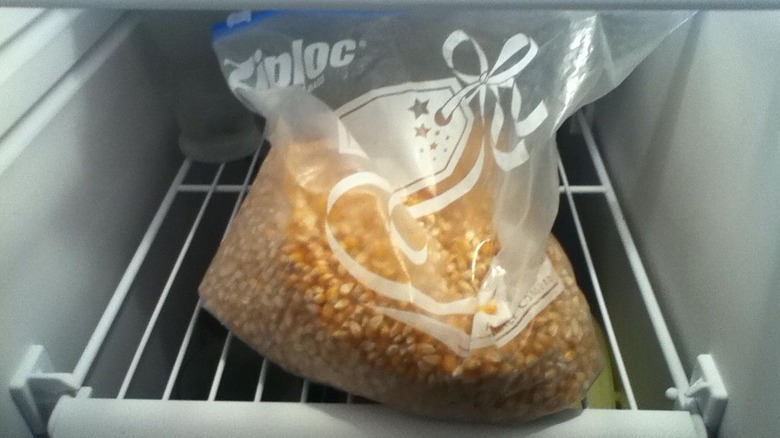You Might Be Storing Your Popcorn Kernels In The Wrong Place
Whether you're hosting a movie night or craving a snack, you can always count on popcorn. It's crunchy, satisfying, delicious, and can be paired with a wide variety of toppings. This is especially true if you pop your own popcorn kernels — because let's face it, nothing beats fresh homemade popcorn.
That being said, you might have heard that some homemade popcorn fans store kernels in the freezer. This is said to increase your popcorn yield (i.e., the number of kernels that actually pop) while extending the kernels' lifespan. But is it true? To find out, we talked to a popcorn pro about whether or not you should freeze popcorn kernels, plus tips for proper storage.
Can You Freeze Popcorn Kernels?
Can You Freeze Popcorn Kernels?
First, a quick food science lesson from Laurine Wickett, founder of Left Coast Catering and head chef at Fluff Nugget, a gourmet made-to-order popcorn shop in San Francisco: "The reason popcorn 'pops' is due to the water trapped inside the kernel. When the kernel is heated to a high temperature, the water will transform into steam. Once the temperature is high enough, the steam builds up pressure inside the kernels and the hull bursts." (FYI, the hull is just the outer covering of the kernel.) The result is a fluffy popped popcorn.
With that in mind, freezing your kernels can actually do more harm than good. As Wickett tells Hunker, freezing will cause the kernels to lose moisture — which, again, is responsible for making the kernel pop in the presence of heat. If this happens, the kernels' water content will be too low, potentially reducing the yield and size of your popcorn, she says. (Writer's note: We reached out to several chefs to get their opinions on freezing popcorn and everyone said there's no reason to do it.)
To put it simply, freezing popcorn kernels can dry them out, resulting in less popped popcorn. And no one wants that.
How to Store Popcorn Kernels
How to Store Popcorn Kernels
Although freezing is an excellent way to store food in general, the same can't be said for popcorn kernels. In this case, it's best to store them at room temperature, like in a kitchen cupboard, says Wickett.
You'll also want to store the kernels in an airtight container. "This prevents the kernels from losing any moisture," Wickett explains, adding that when they're stored properly, popcorn kernels can last for months.
For best results, "consider how much popcorn you use [and] buy smaller amounts more frequently," suggests Wickett. You may be able to find popcorn kernels in bulk at some grocery stores or refill markets. This way, you can ensure that your kernels will always be fresh and ready to pop.
